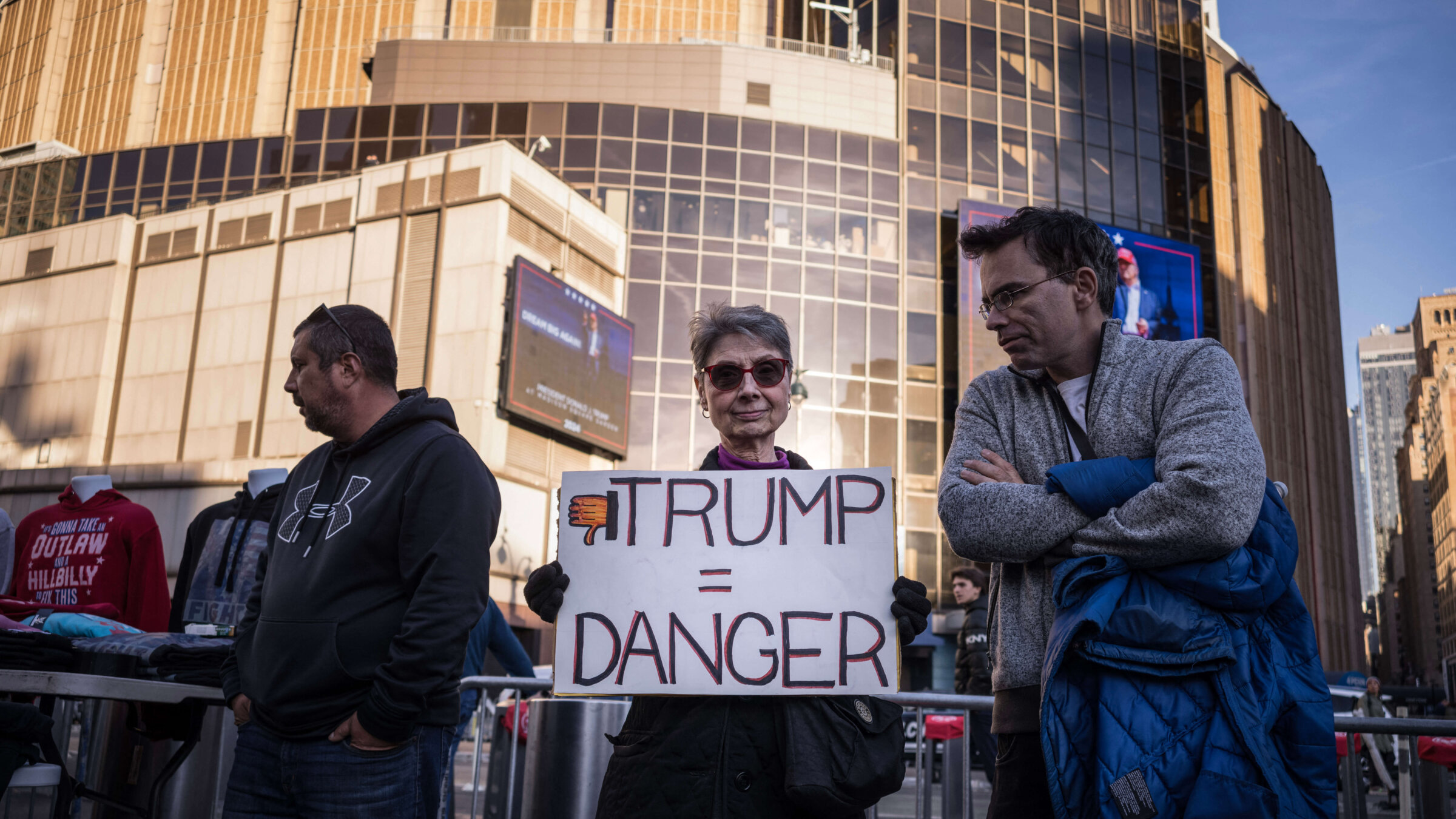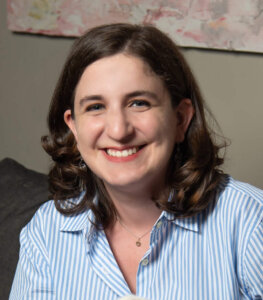In Trump’s appalling new threats to democracy, a troubling warning to Jews
Trump’s Madison Square Garden rally demonstrated what’s at stake for Jewish voters

A demonstrator holds a “Trump = Danger” sign during a “Resist Facism” protest as former US President and Republican presidential candidate Donald Trump holds a campaign rally at Madison Square Garden in New York, October 27, 2024. Photo by MICHEL RUBINEL/AFP via Getty Images
If there was any doubt former President Donald Trump sees his domestic political opponents as “the enemy within,” his rally at Madison Square Garden put them to rest.
“When I say, ‘the enemy from within,’ the other side goes crazy,” Trump told a capacity crowd of 20,000 people on Sunday afternoon. ”They’ve done very bad things to this country. They are indeed the enemy from within.”
When Trump said, “We’re running against something far bigger than Joe or Kamala and far more powerful than them, which is a massive, vicious radical-left machine that runs today’s Democrat party. They’re just vessels,” what I thought of wasn’t Nazi Germany or the famed 1939 Nazi rally in Madison Square Garden that some thought Trump was winking at, but American democracy — and the fate of American democracy is as “Jewish” an issue as Israel, antisemitism, or anything else in this election.
Coverage of Jewish voters often focuses on the candidates’ stances on Israel, Iran and antisemitism. But it is democracy that ranks as the number one issue for American Jews, per polling from the Jewish Democratic Council of America and from the Forward. Israel and antisemitism both rank lower on American Jews’ list of priorities.
That’s because the preservation of democracy itself is an extension of Judaism.
“The form of politics closest in spirit to Judaism at this time is liberal democracy,” wrote Rabbi Jonathan Sacks.
Those who say that liberal-minded Jews are only engaging in progressive politics, not Judaism, might want to read, say, the Bible. Jeremiah repeats God’s message that personal safety and security will be given only “if you execute justice between one party and another; if you do not oppress the stranger, the orphan, and the widow; if you do not shed the blood of the innocent in this place; if you do not follow other gods, to your own hurt.”
Micah says that all that is required is to “do justice, love kindness, and walk humbly with your God,” and that everyone shall sit under his own vine and fig tree and no one shall make them afraid. On Yom Kippur, we read from Isaiah that the point of fasting is not just to fast and feel good about fasting, but “To unlock fetters of wickedness, And untie the cords of the yoke, To let the oppressed go free; To break off every yoke.” In Genesis, we read of Abraham arguing back with God over the fate of those in Sodom and Gomorrah, challenging even the ultimate authority to plead for the lives of the righteous.
This is not all that is in Judaism, a rich and varied tradition from which one could draw the opposite conclusions. But that doesn’t make it superficial, or false, or somehow less Jewish.
But if Judaism gives us reason to think of democracy as a Jewish issue, so does American history. It is liberal democracy that has kept American Jews safe in this country. The United States saw Jews granted full and equal citizenship, something that was, for a while, unlike anything else in the world. And while it was the Constitution that guaranteed equality, it was the practice of liberal democracy — the acting out of freedom of religion, speech, and assembly, and the freedom to have leaders elected by some version of “the people” — that has protected it.
The practice of liberal democracy means that American Jews could organize for labor rights, civil rights, women’s rights, and against war, and to do so as Americans and Jews, letting the two identities bleed into each other, not needing to choose between the two.
It means Jews can run for, and win, and hold elected office. And when elected officials and public personalities speak of globalists and great replacement theory (as commentator Tucker Carlson did at Sunday’s rally) and dog whistle so loudly that humans can hear it, too, liberal democracy is what allows American Jews to speak back without fear. (This is also, incidentally, why crackdowns on protests and speech in the name of support for Israel are ultimately shortsighted for Jews.)
Trump and his supporters threaten all of that. The work is already beginning. Mike Johnson, the Republican Speaker of the House, has already said that he thinks separation of church and state is a “misnomer.” The Supreme Court has already ruled that football coaches in public schools can lead children in prayer, allowing authority figures to foist their religion onto children in what are meant to be secular spaces.
And now, in addition to this, Trump is calling for the mass arrest of his political opponents and lambasting the press as enemies of the people. He is speaking of enemies within, and while this is not primarily directed at Jews, Jews are particularly uncomfortable with the idea of fifth columns and perpetual others.
The fact that Trump is conditioning American Jews’ worth as Jews and citizens on their support for him, preemptively blaming Jews for his election loss and saying any Jew who doesn’t support him “needs to have their head examined,” puts Jews still more squarely in the blast zone of Trump’s wider assault on democracy. And that some Jews, like former White House policy advisor Stephen Miller and radio host Sid Rosenberg decided to speak at Trump’s rally, actively working toward this anti-democratic project, doesn’t make that any less true.
Trump does not believe in liberalism. He does not believe in democracy at its most basic level, insofar as he only accepts the result when he wins. He does not believe in the most fundamental concepts that have let American Jews call this country our home. Democracy is a Jewish issue. At Trump’s rally Sunday night, one could hear very clearly just how much it is at risk.





















